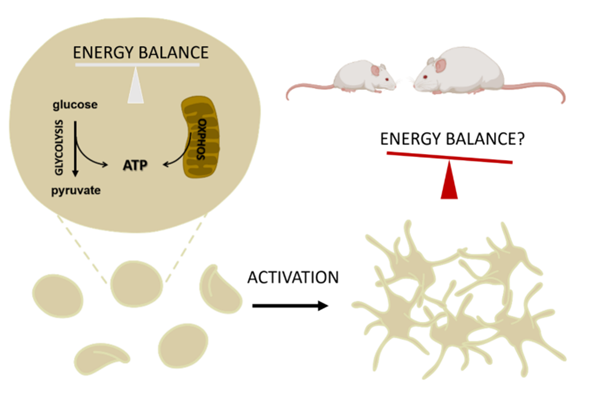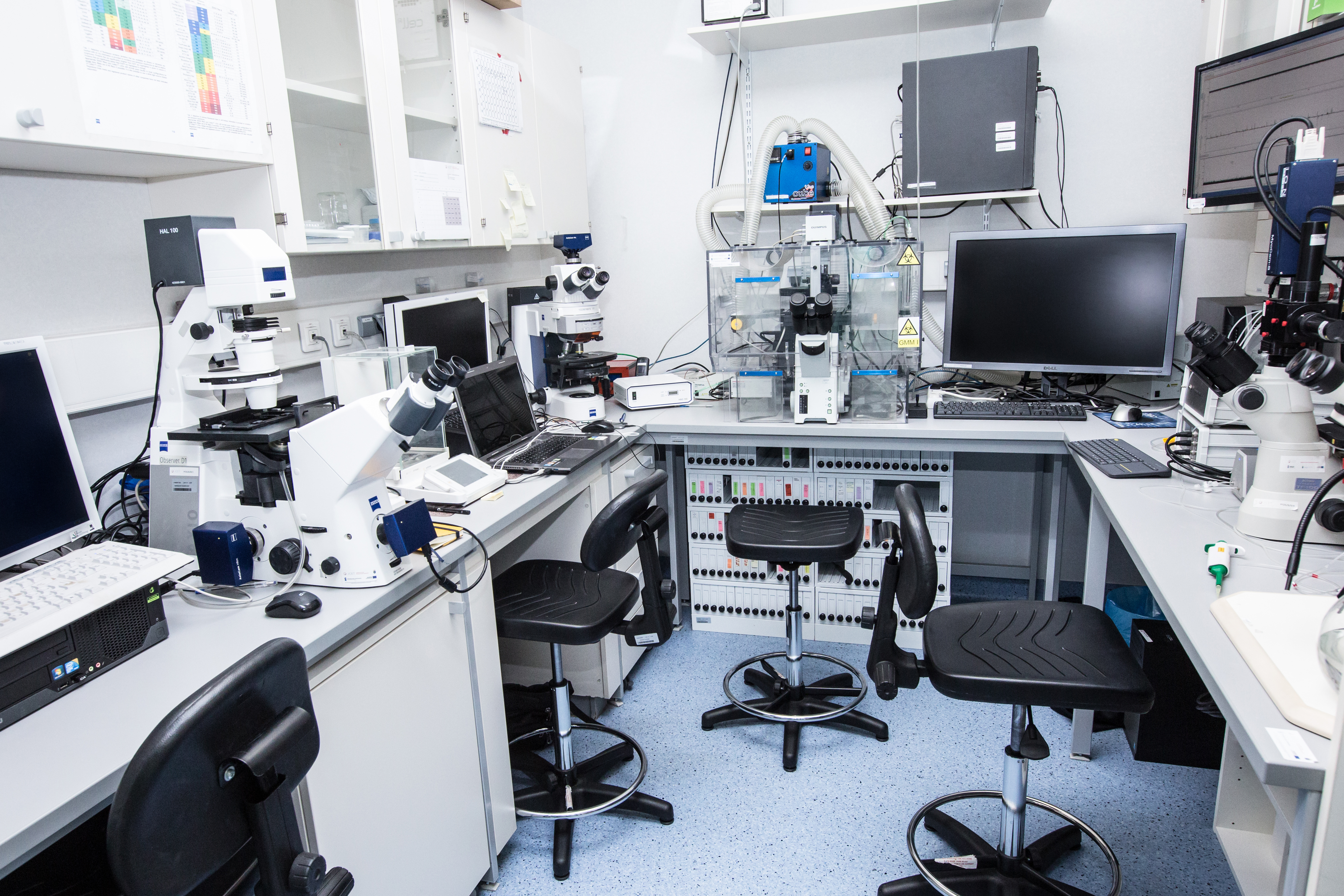
Project description
Thrombosis, which is associated with various cardiovascular diseases, is one of the leading clinical concerns associated with high morbidity and mortality. Importantly, blood platelets in patients with metabolic diseases often exhibit hyperreactivity, leading to an increased risk of cardiovascular events related to thrombosis. Despite antithrombotic treatment, the risk of such events is not eliminated; furthermore, unwanted side effects, such as bleeding, may occur. Platelet aggregation is an energy-demanding process that can be supported by ATP provided by both glycolysis and mitochondrial respiration (Kaczara et al., ATVB 2020; https://doi.org/10.1161/ATVBAHA.120.314284). Most commonly used antiplatelet drugs are directed toward targets that do not affect energy metabolism, therefore current antiplatelet strategies may not provide optimal inhibition of platelet hyperreactivity. It is known that beyond ATP production, cellular metabolism controls the fate of cells. However, it is not yet clear how the imbalance between the cytosolic and mitochondrial energy metabolism processes affects the activity of blood platelets.
The central hypothesis of the project is that reprogramming platelet energy metabolism enhances the action of selected antiplatelet drugs in in vivo models of hyperglycaemia and atherosclerosis. The aim of the project is to explore the metabolic processes responsible for the development of platelet hyperreactivity and to investigate how combined in vivo treatment with selected antiplatelet drugs and metabolic inhibitors affects platelet energy metabolism and activity. Pharmacological modulation of metabolic pathways will be a tool for observing changes at the molecular, organellar, and cellular levels by analyzing metabolic fluxes, ROS and calcium signaling, mitochondrial quality control, and platelet function. The results of the project are expected to identify new metabolic targets for the development of innovative antiplatelet therapies that protect against or decrease thrombosis.
The ideal candidate should fulfil the following criteria:
- master or equivalent degree in biological, medical, pharmaceutical or related areas,
- knowledge and basic experience in cell biology, pharmacology or molecular biology,
- willingness to work with animal models,
- ability to design and perform experiments,
- good communication skills,
- communicative English,
- passion for scientific work
How to apply?
Schedule of the competition:
- Opening of the competition: 04.11.2022
- Application submission deadline: 08.11.2022, noon
- Entrance exams: 24.11-25.11.2022
- Committee meeting - no later than: 25.11.2022
- Exam results: 28.11.2022
- Entries to the Doctoral School: 29.11-01.12.2022
- Entries to the Doctoral School - reserve list: 02.12.2022
Documents required at the recruitment application stage:
- a curriculum vitae (CV) with particular emphasis on scientific achievements;
- a motivation letter, explaining how the applicant’s background and research interests make them a suitable candidate for the position;
- the names of the researchers giving references to the candidate (their contact number and academic title);
- documents demonstrating the scientific achievements listed in the curriculum vitae, e.g. first page of the article;
- transcript of grades: diploma supplement or the official transcript of grades, or another document listing completed courses and grades. Information about the grading scale must be included.
In the event of the persons referred to in Article 186, section 2 of the Act,
- two opinions confirming the high quality of their research work and the high level of
- advancement of such work, issued by: a research fellow holding at least the academic degree
- of doctor habilitated or being an employee of a foreign higher education institution or a
- research institution, that has significant achievements in academic issues related to the
- curriculum.
Any document submitted in a language other than Polish or English must be accompanied by a certified translation into Polish or English.
Documents required for enrollment:
- the original application and a photograph;
- a photocopy and the original for inspection:
- a. a diploma certifying the holding of a degree of Master, Master Engineer or equivalent in a field of study from among those indicated in the detailed conditions of recruitment, or
- b. a diploma of completion of studies abroad, giving the right to enrol in a course of doctoral studies in the issuing country or recognised as equivalent to the appropriate Polish diploma confirming the qualifications of the second degree;
- if the candidate has not yet been issued such a diploma by the deadline for admission,
- he/she shall submit a certificate of completion of such studies and a written undertaking to provide the diploma of higher education entitling to enrol in a course of doctoral studies within the prescribed deadline;
- for inspection: identity document (passport in case of foreigners);
- originals of all other documents provided at the registration stage in the form of a scan.
- In the event of exposure to harmful, noxious or hazardous factors, the applicant will, at the time of registration, be referred for a medical examination by an occupational medicine physician. The candidate shall be obliged to deliver, within the time limit set by the programme manager, a medical certificate confirming the absence of contraindications to take up education.
Higher education diplomas awarded abroad should:
- bear an apostille clause if the issuing country is covered by the Convention abolishing the requirement legalisation for foreign public documents, done at The Hague on 5 October 1961 (Journal of Laws of 2005, No. 112, item 938) or
- be subjected to legalisation, in other cases.
Any document submitted in a language other than Polish or English must be accompanied by a certified translation into Polish or English.
Insurance:
Each doctoral student, including a foreigner, admitted to the doctoral school is obligatorily subject to health insurance if he/she is not covered by such insurance on other grounds (e.g. employment relationship, contract of mandate, business activity, insured as a family member under 26 years of age, as the spouse of an insured person). The health insurance contribution is paid by Jagiellonian University and is financed from the State budget. In addition, a doctoral student receiving a doctoral scholarship is subject to compulsory retirement and disability insurance and accident insurance
IMPORTANT:
A person admitted to the doctoral school begins education and acquires doctoral student rights upon taking the oath. The Department of Personal Affairs reports each doctoral student admitted to the School to compulsory health and social insurance at the commencement of education, i.e. from 1 October at the earliest. Until that time foreign candidates are obliged to cover the costs of insurance for the time of travel, treatment, etc. individually.



